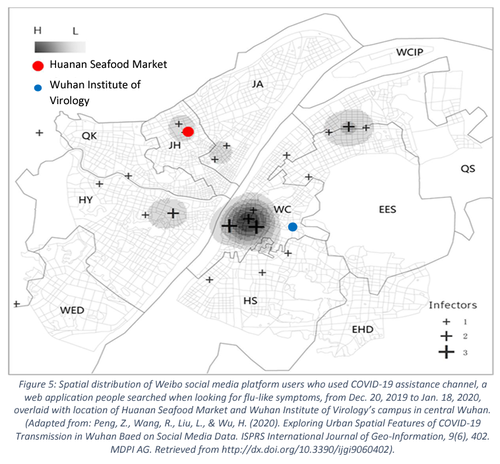Authors: BY TYLER DURDEN FRIDAY, OCT 28, 2022 – 09:50 AM Submitted by QTR’s Fringe Finance
A Senate Committee on Health Education, Labor and Pensions interim report from October 27, 2022 titled “An Analysis of the Origins of the COVID19 Pandemic” has revealed that the origins of Covid were more likely based in a lab as part of a “research related incident” and not zoonotic.
The report was the result of a “bipartisan Health, Education, Labor and Pensions (HELP) Committee oversight effort into the origins of SARS-CoV-2”. It provides a lengthy analysis that reviews “publicly available, open-source information to examine the two prevailing theories of origin of the SARS-CoV-2 virus”.
Among other conclusions, the report notes: “Substantial evidence suggests that the COVID-19 pandemic was the result of a research-related incident associated with a laboratory in Wuhan, China,” the report states.
“A research-related incident is consistent with the early epidemiology showing rapid spread of the virus exclusively in Wuhan with the earliest calls for assistance being located in the same district as the Wuhan Institute of Virology’s (WIV) original campus in central Wuhan. The WIV is an epicenter of advanced coronavirus research, where researchers have collected samples of and experimented on high-risk coronaviruses.”
“While precedent of previous outbreaks of human infections from contact with animals favors the hypothesis that a natural zoonotic spillover is responsible for the origin of SARS-CoV-2, the emergence of SARS-CoV-2 that resulted in the COVID-19 pandemic was most likely the result of a research-related incident.”

In other words, all of us “conspiracy theorists” floating the idea of a lab leak just because of the totally coincidental fact that the virus showed up on a virology lab’s doorstep, have now been validated by the U.S. Senate.
In a section titled “Problems with the Natural Zoonotic Hypothesis”, the report says:
“Based on precedent and genomics, the most likely scenario for a zoonotic origin of the COVID-19 pandemic is that SARS-CoV-2 crossed over the species barrier from an intermediate host to humans. However, the available evidence is also consistent, perhaps more so, with a direct bat-to-human spillover. Both scenarios remain plausible and, in the absence of additional information, should be considered equally valid hypotheses.”
“However, nearly three years after the COVID-19 pandemic began, critical evidence that would prove that the emergence of SARS-CoV-2 and resulting COVID-19 pandemic was caused by a natural zoonotic spillover is missing.”
“Such gaps include the failure to identify the original host reservoir, the failure to identify a candidate intermediate host species, and the lack of serological or epidemiological evidence showing transmission from animals to humans, among others outlined in this report,” the report states.
“As a result of these evidentiary gaps, it is hard to treat the natural zoonotic spillover theory as the presumptive origin of the COVID-19 pandemic.”
Then, in the report’s conclusion, it states:
“Based on the analysis of the publicly available information, it appears reasonable to conclude that the COVID-19 pandemic was, more likely than not, the result of a research-related incident. New information, made publicly available and independently verifiable, could change this assessment. However, the hypothesis of a natural zoonotic origin no longer deserves the benefit of the doubt, or the presumption of accuracy.”
The report was signed off on by Richard Burr, United States Senator and Ranking Member, U.S. Senate Committee on Health, Education, Labor, and Pensions.
Get 50% off: If you enjoy this article, I would love to have you as a subscriber and can offer you 50% off for life: Get 50% off forever
Regarding the report’s research process, Burr wrote:
“Over the last fifteen months, HELP Committee Minority oversight staff carefully reviewed several hundred publicly available scientific studies, interviewed several dozen subject matter experts, and analyzed previous reports and studies on the possible origins of the virus. I believe that this report provides a significant contribution to the existing body of evidence and helps establish parameters for how future analyses should be reviewed.”
And for the icing on the cake, just weeks ago Taiwan also concluded that the virus likely did not come from the Wuhan wet markets. The country’s Central Epidemic Command Center (CECC) said in late September, in a revelation that went mostly unnoticed by the mainstream media, that “it does not believe the wet market to be the source of the COVID pandemic and suggested that a leak from a laboratory in Wuhan is a possibility.”
“Our speculation is we think the Wuhan Huanan wet market is not the origin. [The market is] probably just a very important step in the transmission chain. The origin is somewhere else,” said Philip Lo, deputy head of the CECC’s medical response division, Taiwan News reported.
“Maybe it’s still in Wuhan, for example, the laboratory…we don’t have proof, solid evidence,” Lo continued.
This news should come as no surprise to anyone who has been reading Fringe Finance. Back in early September I published the thoughts of Harvard PhD and Rutgers professor Dr. Richard Ebright, who said Covid was “much more easily explained” by a lab leak: Covid “Much More Easily Explained” By Lab Leak: Harvard PhD & Rutgers Chem Professor
Upon reviewing the thread laid out by Ebright, Justin B. Kinney, an Associate Professor at Cold Spring Harbor Laboratory and Princeton PhD commented that the thread was “much more compelling” than the evidence recently published by Worobey et al. and Pekar et al. in Science,” referring to a July 2022 study that concluded the virus came from the Huanan Seafood Wholesale Market (and was riddled, in my opinion, with conflicts of interest and ties to the CDC and WHO).
“This evidence is not dispositive, but were the lab leak hypothesis incorrect, it would represent a staggering set of coincidences,” Kinney wrote back in September.
Unforunately, these findings have not prevented Peter Daszak’s EcoHealth Alliance from receiving more funding, which it has this year to the tune of at least $2 million.
You can read the new Senate report for yourself here.
QTR’s Fringe Finance is a reader-supported publication. To receive new posts and support my work, consider becoming a free or paid subscriber: Get 50% off forever
